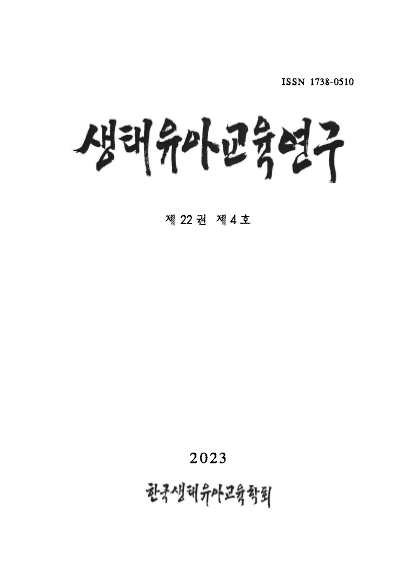유아의 또래유능성 관련 변인에 관한 메타분석: 국내 학술지 논문을 중심으로
A meta-Analysis of variables associated with peer competence in young children: Insights from korean research
- 한국생태유아교육학회
- 생태유아교육연구
- 제22권 제4호
-
2023.1199 - 124 (26 pages)
- 97

본 연구에서는 유아의 또래유능성 관련 변인에 대한 효과 크기를 분석하고, 각 변인의 영향력을 파악하여 추후 연구의 방향성을 제시하는 것을 목적으로 하였다. 이를 위해 유아의 또래유능성과 관련된 연구에 사용된 변인을 분석하여 정적변인군과 부적변인군으로 나눈 후, R program을 사용한 메타분석을 통해 검증하였다. 연구결과는 다음과 같다. 첫째, 유아의 또래유능성 관련 정적변인군 중 자아존중감, 자기효능감, 자기조절력, 의사결정력, 유아-교사관계(친밀감), 아버지 양육태도(애정, 자율), 어머니 긍정적 정서표현, 어머니 양육행동(온정, 수용), 어머니-유아 의사소통(긍정)이 높을수록 또래유능성이 높은 것으로 나타났다. 둘째, 유아의 또래유능성 관련 부적변인군 중 유아-교사관계(의존, 갈등), 아버지 양육태도(거부), 어머니 양육태도(거부)의 비율이 높을수록 유아의 또래유능성이 낮은 것으로 나타났다. 본 연구는 유아의 또래유능성과 관련이 있는 변인들의 효과크기를 체계적이고 종합적으로 밝힐 수 있었다는 데 연구로서 가치가 있으며, 또래유능성 향상을 위한 프로그램 개발과 정책 수립을 위한 필수자료를 제시하였다는 데 의의가 있다.
This study conducted a meta-analysis to explore the effect sizes of variables related to peer competence in infants to identify the influence of each variable and indicate directions of future research. Out of 805 papers, a total of 36 papers were selected for analysis through the PRISMA analysis process. We divided the studies on peer competence in infants into those focusing on strengthening and weakening variables, and verified the effect sizes of the variables through meta-analysis. The results are as follows: First, self-esteem, self-efficacy, self-regulation, decision-making, infant-teacher relationship, father’s parenting attitudes, mother’s positive emotional expression, mother’s parenting behaviors, and mother-infant communication were reinforcing variables for peer competence in infants. Second, the higher the effect size of infant-teacher relationship, father’s parenting attitudes, and mother’s parenting attitudes among the moderators of infant peer competence, the lower the infant’s peer competence. This study is valuable because it comprehensively and systematically examined the effect sizes of variables associated with infants’ peer competence, and it is significant because it provides basic data for program development and policy formulation to improve peer competence.
Ⅰ. 서 론
Ⅱ. 연구방법
Ⅲ. 연구 결과
Ⅳ. 논의 및 결론
(0)
(0)